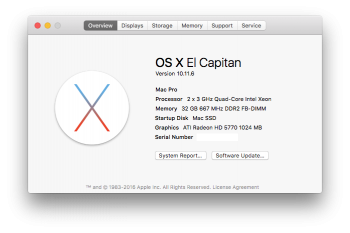Anonymous UUID: 4DB5E816-DBF7-3AD3-4F44-55FBE495FC29
Tue Jun 6 20:06:53 2017
*** Panic Report ***
panic(cpu 3 caller 0xffffff801f7cbe03): Kernel trap at 0xffffff801f76a508, type 13=general protection, registers:
CR0: 0x0000000080010033, CR2: 0x000000011428907a, CR3: 0x000000000fde4000, CR4: 0x0000000000002660
RAX: 0x26902b060b08080f, RBX: 0x0000000000002070, RCX: 0xffffff801fec1400, RDX: 0xffffff801feb43a0
RSP: 0xffffff90f22bb380, RBP: 0xffffff90f22bb3b0, RSI: 0x0000000000000000, RDI: 0xffffff801feb43a0
R8: 0xffffff8035a16800, R9: 0x000000000000000b, R10: 0xffffff803fda59f8, R11: 0xffffff803fdafb90
R12: 0xffffff801feb43a0, R13: 0xffffff803fd940e0, R14: 0xffffff90f22bb3d0, R15: 0x0000000000000000
RFL: 0x0000000000010292, RIP: 0xffffff801f76a508, CS: 0x0000000000000008, SS: 0x0000000000000010
Fault CR2: 0x000000011428907a, Error code: 0x0000000000000000, Fault CPU: 0x3, PL: 1
Backtrace (CPU 3), Frame : Return Address
0xffffff80eab05df0 : 0xffffff801f6d7b92
0xffffff80eab05e70 : 0xffffff801f7cbe03
0xffffff80eab06050 : 0xffffff801f7e9bb3
0xffffff80eab06070 : 0xffffff801f76a508
0xffffff90f22bb3b0 : 0xffffff801fbd7220
0xffffff90f22bb5a0 : 0xffffff801f8fbe77
0xffffff90f22bb630 : 0xffffff801fafdb45
0xffffff90f22bb760 : 0xffffff801fb26647
0xffffff90f22bb920 : 0xffffff801fb2fb05
0xffffff90f22bb960 : 0xffffff801faf0000
0xffffff90f22bbbb0 : 0xffffff801faee07a
0xffffff90f22bbbe0 : 0xffffff801f8d446c
0xffffff90f22bbf60 : 0xffffff801fc25691
0xffffff90f22bbfb0 : 0xffffff801f7ea3b6
BSD process name corresponding to current thread: mdworker
Boot args: nvda_drv=1
Mac OS version:
15G1510
Kernel version:
Darwin Kernel Version 15.6.0: Tue Apr 11 16:00:51 PDT 2017; root:xnu-3248.60.11.5.3~1/RELEASE_X86_64
Kernel UUID: 4BE0C0F5-2855-346B-8595-18FFCE9A51DC
Kernel slide: 0x000000001f400000
Kernel text base: 0xffffff801f600000
__HIB text base: 0xffffff801f500000
System model name: MacPro2,1 (Mac-F42C88C8)
System uptime in nanoseconds: 126612335307
last loaded kext at 13857180151: com.apple.driver.AudioAUUC 1.70 (addr 0xffffff7fa1770000, size 32768)
loaded kexts:
com.nvidia.CUDA 1.1.0
com.nvidia.web.GeForceWeb 10.1.1
com.nvidia.web.NVDAGM100HalWeb 10.1.1
com.nvidia.web.NVDAResmanWeb 10.1.1
com.nvidia.NVDAStartupWeb 10.1.1
com.apple.driver.AudioAUUC 1.70
com.apple.driver.AppleGraphicsDevicePolicy 3.12.7
com.apple.filesystems.autofs 3.0
com.apple.driver.AppleTyMCEDriver 1.0.2d2
com.apple.driver.AppleOSXWatchdog 1
com.apple.driver.AppleHDAHardwareConfigDriver 274.12
com.apple.driver.AppleHDA 274.12
com.apple.driver.pmtelemetry 1
com.apple.iokit.IOUserEthernet 1.0.1
com.apple.driver.AppleUpstreamUserClient 3.6.1
com.apple.driver.AppleMCCSControl 1.2.13
com.apple.iokit.IOBluetoothSerialManager 4.4.6f1
com.apple.Dont_Steal_Mac_OS_X 7.0.0
com.apple.driver.ACPI_SMC_PlatformPlugin 1.0.0
com.apple.driver.AppleHV 1
com.apple.driver.AppleLPC 3.1
com.apple.iokit.CSRBluetoothHostControllerUSBTransport 4.4.6f1
com.apple.driver.AppleIntelSlowAdaptiveClocking 4.0.0
com.apple.driver.AppleFIVRDriver 4.1.0
com.apple.nvidia.NVDAStartup 10.1.0
com.apple.iokit.IOAHCIBlockStorage 2.8.5
com.apple.driver.AppleUSBDisplays 378
com.apple.driver.CSRHIDTransitionDriver 4.4.6f1
com.apple.driver.AppleFileSystemDriver 3.0.1
com.apple.AppleFSCompression.AppleFSCompressionTypeDataless 1.0.0d1
com.apple.AppleFSCompression.AppleFSCompressionTypeZlib 1.0.0
com.apple.BootCache 38
com.apple.driver.AppleIntel8254XEthernet 3.1.4b1
com.apple.driver.AppleFWOHCI 5.5.4
com.apple.driver.AppleAHCIPort 3.1.8
com.apple.driver.AppleIntelPIIXATA 2.5.1
com.apple.driver.AirPortBrcm43224 700.36.24
com.apple.driver.usb.AppleUSBEHCIPCI 1.0.1
com.apple.driver.usb.AppleUSBUHCIPCI 1.0.1
com.apple.driver.AppleACPIButtons 4.0
com.apple.driver.AppleRTC 2.0
com.apple.driver.AppleHPET 1.8
com.apple.driver.AppleSMBIOS 2.1
com.apple.driver.AppleACPIEC 4.0
com.apple.driver.AppleAPIC 1.7
com.apple.driver.AppleIntelCPUPowerManagementClient 218.0.0
com.apple.nke.applicationfirewall 163
com.apple.security.quarantine 3
com.apple.security.TMSafetyNet 8
com.apple.driver.AppleIntelCPUPowerManagement 218.0.0
com.apple.driver.AppleGraphicsControl 3.12.9
com.apple.kext.triggers 1.0
com.apple.driver.DspFuncLib 274.12
com.apple.kext.OSvKernDSPLib 525
com.apple.driver.AppleSMBusController 1.0.14d1
com.apple.iokit.IOSurface 108.2.4
com.apple.iokit.IOSerialFamily 11
com.apple.driver.CoreCaptureResponder 1
com.apple.iokit.IOAcceleratorFamily2 205.11
com.apple.AppleGraphicsDeviceControl 3.12.9
com.apple.driver.AppleSMBusPCI 1.0.14d1
com.apple.driver.IOPlatformPluginLegacy 1.0.0
com.apple.driver.AppleHDAController 274.12
com.apple.iokit.IOHDAFamily 274.12
com.apple.iokit.IOAudioFamily 204.4
com.apple.vecLib.kext 1.2.0
com.apple.driver.IOPlatformPluginFamily 6.0.0d7
com.apple.iokit.IOBluetoothHostControllerUSBTransport 4.4.6f1
com.apple.iokit.IOBluetoothFamily 4.4.6f1
com.apple.iokit.IOFireWireIP 2.2.6
com.apple.iokit.IOSlowAdaptiveClockingFamily 1.0.0
com.apple.driver.AppleSMC 3.1.9
com.apple.iokit.IONDRVSupport 2.4.1
com.apple.iokit.IOGraphicsFamily 2.4.1
com.apple.iokit.IOSCSIArchitectureModelFamily 3.7.7
com.apple.driver.AppleXsanScheme 3
com.apple.driver.AppleHIDKeyboard 181
com.apple.driver.usb.IOUSBHostHIDDevice 1.0.1
com.apple.driver.AppleUSBComposite 900.4.1
com.apple.iokit.IOUSBHIDDriver 900.4.1
com.apple.iokit.IOUSBHIDDriverPM 900.4.1
com.apple.driver.usb.cdc 5.0.0
com.apple.driver.usb.networking 5.0.0
com.apple.driver.usb.AppleUSBHostCompositeDevice 1.0.1
com.apple.driver.usb.AppleUSBHub 1.0.1
com.apple.iokit.IOFireWireFamily 4.6.1
com.apple.iokit.IOAHCIFamily 2.8.1
com.apple.iokit.IOATAFamily 2.5.3
com.apple.driver.usb.AppleUSBXHCIPCI 1.0.1
com.apple.driver.usb.AppleUSBXHCI 1.0.1
com.apple.iokit.IO80211Family 1110.26
com.apple.iokit.IONetworkingFamily 3.2
com.apple.driver.corecapture 1.0.4
com.apple.driver.usb.AppleUSBUHCI 1.0.1
com.apple.driver.usb.AppleUSBEHCI 1.0.1
com.apple.iokit.IOUSBFamily 900.4.1
com.apple.iokit.IOUSBHostFamily 1.0.1
com.apple.driver.AppleUSBHostMergeProperties 1.0.1
com.apple.driver.AppleEFINVRAM 2.0
com.apple.driver.AppleEFIRuntime 2.0
com.apple.iokit.IOHIDFamily 2.0.0
com.apple.iokit.IOSMBusFamily 1.1
com.apple.security.sandbox 300.0
com.apple.kext.AppleMatch 1.0.0d1
com.apple.driver.AppleKeyStore 2
com.apple.driver.AppleMobileFileIntegrity 1.0.5
com.apple.driver.AppleCredentialManager 1.0
com.apple.driver.DiskImages 417.4
com.apple.iokit.IOStorageFamily 2.1
com.apple.iokit.IOReportFamily 31
com.apple.driver.AppleFDEKeyStore 28.30
com.apple.driver.AppleACPIPlatform 4.0
com.apple.iokit.IOPCIFamily 2.9
com.apple.iokit.IOACPIFamily 1.4
com.apple.kec.Libm 1
com.apple.kec.pthread 1
com.apple.kec.corecrypto 1.0
Model: MacPro2,1, BootROM MP21.007F.B06, 4 processors, Dual-Core Intel Xeon, 2.66 GHz, 6 GB, SMC 1.7f10
Graphics: NVIDIA GeForce GTX 970, NVIDIA GeForce GTX 970, PCIe, 4095 MB
Graphics: NVIDIA GeForce 7300 GT, NVIDIA GeForce 7300 GT, PCIe, 9 MB
Memory Module: DIMM Riser A/DIMM 1, 1 GB, DDR2 FB-DIMM, 667 MHz, 0x802C, 0x313848463132383732464436363742354533
Memory Module: DIMM Riser A/DIMM 2, 1 GB, DDR2 FB-DIMM, 667 MHz, 0x80AD, 0x48594D5035313246373242503844322D5935
Memory Module: DIMM Riser B/DIMM 1, 1 GB, DDR2 FB-DIMM, 667 MHz, 0x80AD, 0x48594D5035313246373242503844322D5935
Memory Module: DIMM Riser B/DIMM 2, 1 GB, DDR2 FB-DIMM, 667 MHz, 0x80AD, 0x48594D503531324637324350384E332D5935
Memory Module: DIMM Riser A/DIMM 3, 512 MB, DDR2 FB-DIMM, 667 MHz, 0x830B, 0x4E54353132543732553839413842442D3343
Memory Module: DIMM Riser A/DIMM 4, 512 MB, DDR2 FB-DIMM, 667 MHz, 0x830B, 0x4E54353132543732553839413842442D3343
Memory Module: DIMM Riser B/DIMM 3, 512 MB, DDR2 FB-DIMM, 667 MHz, 0x80AD, 0x48594D5035363441373242503844322D5935
Memory Module: DIMM Riser B/DIMM 4, 512 MB, DDR2 FB-DIMM, 667 MHz, 0x80AD, 0x48594D5035363441373242503844322D5935
AirPort: spairport_wireless_card_type_airport_extreme (0x14E4, 0x8C), Broadcom BCM43xx 1.0 (5.10.131.36.16)
Bluetooth: Version 4.4.6f1 17910, 3 services, 26 devices, 1 incoming serial ports
Network Service: Wi-Fi, AirPort, en2
Serial ATA Device: SanDisk Ultra II 480GB, 480.1 GB
USB Device: USB Bus
USB Device: USB Bus
USB Device: Bluetooth HCI
USB Device: USB Bus
USB Device: USB Bus
USB Device: USB 2.0 Bus
USB Device: Hub
USB Device: Keyboard Hub
USB Device: Apple Keyboard
USB Device: SteelSeries Rival 100 Gaming Mouse
USB Device: Apple Cinema HD Display
USB Device: USB 3.0 Bus
USB Device: Hub
USB Device: BUP Slim BL
USB Device: USB2.0 Hub
FireWire Device: built-in_hub, Up to 800 Mb/sec
FireWire Device: unknown_device, Unknown
Thunderbolt Bus:


